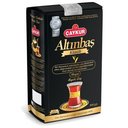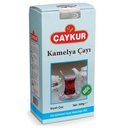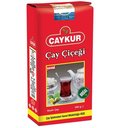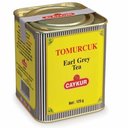Filiz Cayi (Tea Special, Black Tea)
40
Percentile
4 ratings |
|
Commercial Description
(RateTea Translation) Filiz tea, which includes a large portion of buds, is a natural, pure tea like other Çaykur products, where the blend's quality is felt in its softness. Ideal for discerning palates...
* Amazon links are sponsored and help support RateTea financially.
Ratings & Reviews
Page 1 of 1 page with 4 reviews
 73 Aroma: 7/10 Flavor: 3/5 Value: 5/5
73 Aroma: 7/10 Flavor: 3/5 Value: 5/5Brome (1 reviews) on Sep. 14th, 2014
This was the first tea that I really appreciated in my life, so I may be a bit partial. I really like this tea prepared the Turkish way with a fair amount of sugar. Its taste is really peculiar.
I've tasted other Turkish teas, but this one stays my favorite.
 73 Aroma: 6/10 Flavor: 4/5 Value: 5/5
73 Aroma: 6/10 Flavor: 4/5 Value: 5/5Simon Cohen (1 reviews) on Jul. 4th, 2013
This is a typical Turkish everyday tea. The tea itself is grown in Rize, in the Karadeniz (English: black sea) region of northern Turkey. The climate in this region is mild and wet and as a result this region produces pleasingly delicate tea which is lightly floral, toasty and low in tannins. The light, low tannin nature of Turkish tea means it is perfectly suited for extended steeping. This is typical of Turkish tea culture where tea is prepared in the çaydanlık (English: tea kettle), a specially designed double kettle similar to a samovar which is used to prolong the infusion of the tea using indirect heat.
The flavour profile is very similar to other tea from along the Black Sea coast; light, slightly floral, toasty and lacking in tannic bitterness and astringency, perfect for every day consumption. Tea from this region is referred to Karadeniz cay (black sea tea).
The name 'filiz cayi' refers to the type of tea, in this case the tea is made from the sprouting tea buds, 'filiz' meaning bud and 'cayi' (chai) meaning tea.
The tea is ground very finely for use in the çaydanlık in order extract maximum flavour through extended steeping. The instructions on the side of the packet recommend a steeping time of 10-12 minutes. However, if you don't own a çaydanlık I find the tea is just as nice if heated in a teapot in a preheated oven at 100c for 5-10 minutes.
I paid £3.49 for a 500g packet, very cheap for a tea of this quality.
 67 Aroma: 5/10 Flavor: 4/5 Value: 4/5
67 Aroma: 5/10 Flavor: 4/5 Value: 4/5Linda Martin (50 reviews) on Nov. 2nd, 2011
I enjoy blending this with other teas, but it is good on its own, too. Great price.
 63 Aroma: 5/10 Flavor: 4/5 Value: 5/5
63 Aroma: 5/10 Flavor: 4/5 Value: 5/5Alex Zorach (1453 reviews) on Nov. 2nd, 2011
A very light tea...aroma suggestive of rice and cereal. Muted flavor. A hint of wintergreen in the finish. Not terribly complex, however. I'm starting to get a sense for a particular character that Turkish teas have, and this was recognizable as such.
The leaf of this tea is so finely broken that it falls through most tea strainers...only one of my strainers, the finum basket infuser, could handle it.
Like other Turkish teas I've tried, this was surprisingly gentle given its finely-broken nature, but I'd still prefer something whole-leaf.
The price is absolutely dirt cheap though. For an organically-grown tea this smooth, it's a steal!
Page 1 of 1 page with 4 reviews





